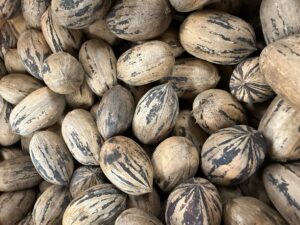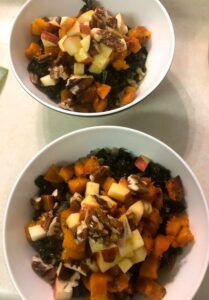Pecans: A North Carolina Tradition
go.ncsu.edu/readext?1104169
en Español / em Português
El inglés es el idioma de control de esta página. En la medida en que haya algún conflicto entre la traducción al inglés y la traducción, el inglés prevalece.
Al hacer clic en el enlace de traducción se activa un servicio de traducción gratuito para convertir la página al español. Al igual que con cualquier traducción por Internet, la conversión no es sensible al contexto y puede que no traduzca el texto en su significado original. NC State Extension no garantiza la exactitud del texto traducido. Por favor, tenga en cuenta que algunas aplicaciones y/o servicios pueden no funcionar como se espera cuando se traducen.
Português
Inglês é o idioma de controle desta página. Na medida que haja algum conflito entre o texto original em Inglês e a tradução, o Inglês prevalece.
Ao clicar no link de tradução, um serviço gratuito de tradução será ativado para converter a página para o Português. Como em qualquer tradução pela internet, a conversão não é sensivel ao contexto e pode não ocorrer a tradução para o significado orginal. O serviço de Extensão da Carolina do Norte (NC State Extension) não garante a exatidão do texto traduzido. Por favor, observe que algumas funções ou serviços podem não funcionar como esperado após a tradução.
English
English is the controlling language of this page. To the extent there is any conflict between the English text and the translation, English controls.
Clicking on the translation link activates a free translation service to convert the page to Spanish. As with any Internet translation, the conversion is not context-sensitive and may not translate the text to its original meaning. NC State Extension does not guarantee the accuracy of the translated text. Please note that some applications and/or services may not function as expected when translated.
Collapse ▲ A few weeks ago, a volunteer brought in some of his harvest to share, a whole bucket of unshelled pecans! I was instantly transported back to my childhood in Turkey, North Carolina. My great-grandmother Inez lived there, and I spent most of my summer days, and many holidays, at her home. She had a chicken coop with hens roaming freely through the yard, an old smokehouse where she used to cure hams, and two large pecan trees that shaded the backyard. As a kid, one of my jobs was to roll the pecan picker-upper across the grass to gather the nuts as they fell. The moment the volunteer brought those pecans through the door, that is exactly where my mind went. Those simple chores shaped so many of my earliest memories.
A few weeks ago, a volunteer brought in some of his harvest to share, a whole bucket of unshelled pecans! I was instantly transported back to my childhood in Turkey, North Carolina. My great-grandmother Inez lived there, and I spent most of my summer days, and many holidays, at her home. She had a chicken coop with hens roaming freely through the yard, an old smokehouse where she used to cure hams, and two large pecan trees that shaded the backyard. As a kid, one of my jobs was to roll the pecan picker-upper across the grass to gather the nuts as they fell. The moment the volunteer brought those pecans through the door, that is exactly where my mind went. Those simple chores shaped so many of my earliest memories.
 Inez was known for several things: her style, her sense of humor, and her love of cooking, especially baking. As I grew older, and after Inez passed away, I began taking an interest in baking myself. I spent time with my grandmother trying to piece together bits of Inez’s recipes, and we visited distant relatives in search of anything written down by those who were long gone. While I still cannot hand-whip my meringue like Inez could, and the old recipes often contradict each other, her pecan pie, which is heavy on the pecans, was the first thing I mastered. It’s a staple at every Thanksgiving and Christmas gathering, and each time I bake it, I’m reminded of her.
Inez was known for several things: her style, her sense of humor, and her love of cooking, especially baking. As I grew older, and after Inez passed away, I began taking an interest in baking myself. I spent time with my grandmother trying to piece together bits of Inez’s recipes, and we visited distant relatives in search of anything written down by those who were long gone. While I still cannot hand-whip my meringue like Inez could, and the old recipes often contradict each other, her pecan pie, which is heavy on the pecans, was the first thing I mastered. It’s a staple at every Thanksgiving and Christmas gathering, and each time I bake it, I’m reminded of her.
For many generations, pecan trees have grown on family homesteads in southeastern North Carolina, whether for profit or for food. In years with a full crop, North Carolina is estimated to produce more than 5 to 6 million pounds, with a significant majority sold and consumed locally through farm markets. Production ranges from just a few backyard trees to commercial orchards with 30 or more acres.
 While I still love pecans for pie, I have expanded my use of them in recent years. Pecans are packed with nutrients and are a good source of healthy fats and protein. They contain 19 essential vitamins and minerals including vitamin A, magnesium, potassium, and calcium among others. I often teach about the benefits of adding nuts and seeds to our diets, and pecans are a versatile nut that should always be on the list. They are a great snack, a perfect addition to a salad, and a delicious topping for breakfast yogurt or granola. Their rich flavor pairs beautifully with both savory and sweet dishes, which makes them easy to incorporate into everyday meals.
While I still love pecans for pie, I have expanded my use of them in recent years. Pecans are packed with nutrients and are a good source of healthy fats and protein. They contain 19 essential vitamins and minerals including vitamin A, magnesium, potassium, and calcium among others. I often teach about the benefits of adding nuts and seeds to our diets, and pecans are a versatile nut that should always be on the list. They are a great snack, a perfect addition to a salad, and a delicious topping for breakfast yogurt or granola. Their rich flavor pairs beautifully with both savory and sweet dishes, which makes them easy to incorporate into everyday meals.
Morgan King is the Family & Consumer Sciences Extension Agent for N.C. Cooperative Extension – New Hanover County Center and Arboretum. The office is located at the Arboretum, 6206 Oleander Drive, and is open daily from 8 a.m. to 5 p.m. You can reach her at morgan_king@ncsu.edu or 910-798-7660.




